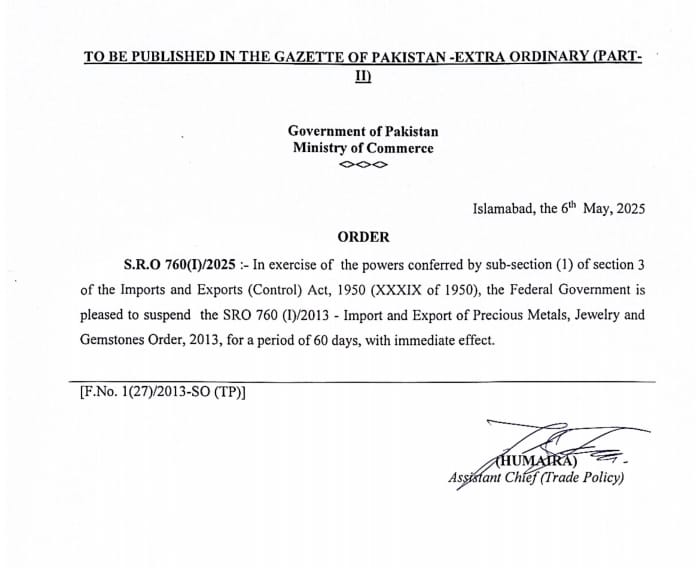Islamabad: Pakistan has banned import and exports of precious mineral, gemstones and metals and jewels for next 60 days with immediate effect.
A notification has been issued in this regard from the Ministry of Commerce.
It reads as, “In exercise of the powers conferred by sub-section (1) of section 3 of the Imports and Exports (Control) Act, 1950 (XXXIX of 1950), the Federal Government is pleased to suspend the SRO 760 (1)/2013 – Import and Export of Precious Metals, Jewelry and Gemstones Order, 2013, for a period of 60 days, with immediate effect”.
Gold and Gold Jewellery Trade: Pakistan’s Evolving Regulatory and Market Landscape
The import and export of gold and gold jewellery in Pakistan play a vital role in the country’s trade and investment ecosystem, particularly within the context of regional connectivity and economic diversification.
Gold remains both a traditional store of value and a key component in Pakistan’s cultural, financial, and manufacturing sectors.
On the import front, Pakistan primarily sources gold from the United Arab Emirates, Switzerland, and other gold-trading hubs.
Imports are strictly regulated by the State Bank of Pakistan (SBP) and the Federal Board of Revenue (FBR), which require importers to follow specific documentation, customs duties, and foreign exchange rules.
Importing raw or semi-processed gold typically involves approval from designated financial institutions, while all transactions must comply with anti-money laundering (AML) and know-your-customer (KYC) regulations.
As for exports, Pakistan’s gold jewellery industry has strong potential for growth, particularly in Gulf and Southeast Asian markets.

Pakistani jewellers are known for intricate craftsmanship, and there is rising demand in expatriate and luxury segments.
However, the sector faces constraints such as outdated technology, limited branding, and inconsistent supply of high-quality raw materials.
The government has introduced various incentives for exporters, including duty drawbacks, zero-rating for certain inputs, and simplified export documentation under the Export Facilitation Scheme.
In 2023, Pakistan relaxed some restrictions on gold imports to encourage transparency and reduce smuggling, while also launching digital mechanisms for customs valuation and tracking.
Despite these reforms, the sector continues to face volatility due to global gold prices, currency depreciation, and regional political tensions.
Read More: $5 Billion Worth of Gemstones Smuggled Out of Pakistan Annually
As Pakistan aims to boost non-traditional exports, gold jewellery remains a key focus area.
Streamlining policy, improving quality standards, and establishing trade corridors under initiatives like RCEnet could significantly enhance Pakistan’s position in the regional gold trade landscape.
Gemstones
Pakistan is rich in precious gemstones such as emeralds, rubies, sapphires, and peridot, primarily mined in regions like Gilgit-Baltistan, Swat, and Chitral.
These stones are exported to markets in Europe, the Middle East, and East Asia, contributing to foreign exchange earnings.
However, the sector faces challenges including lack of modern mining techniques, limited value addition, and informal trade practices.
Imports of finished gemstones and related tools are minimal but necessary for processing and jewelry manufacturing.
Also Read: PM: Trillions in Minerals Can Secure Pakistan’s Economic Independence
With better regulation, skill development, and international marketing, Pakistan’s gemstone industry holds significant potential for growth in both regional and global markets.









